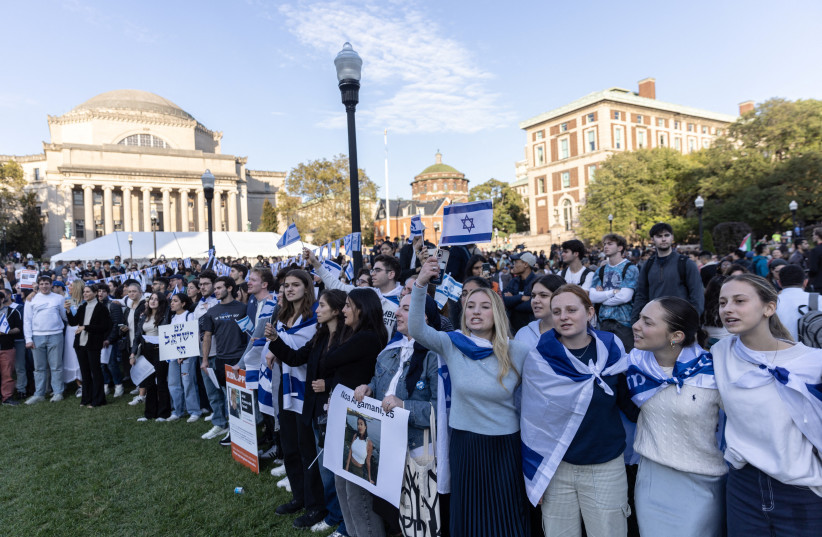A Jewish billionaire investor and philanthropist quit the board of Columbia Business School, saying the campus had become unsafe for Jews since the launch of the Israel-Hamas war.
“With blatantly anti-Jewish student groups and professors allowed to operate with complete impunity, it sends a clear and distressing message that Jews are not just unwelcome, but also unsafe on campus,” Henry Swieca said in an Oct. 30 letter obtained Tuesday by the Jewish Telegraphic Agency. “My resignation is an expression of my deep concern for the direction in which the university is heading.” The Board of Overseers is the school’s main fundraising arm.
Swieca, 66, is the founder in 2010 of Talpion Fund Management and the cofounder of Highbridge Capital Management, which was acquired by J.P. Morgan Chase in 2008. The child of Holocaust survivors, he has been a member of the business school’s Board of Overseers since 2014. Forbes lists his worth as $1.9 billion.
His resignation, which he did not announce publicly, comes amid a flurry of protests by Jewish supporters of elite universities in response to the schools’ handling of the Israel-Hamas war following Oct. 7, when Hamas attacked Israel. Prominent supporters of Harvard University and the University of Pennsylvania have announced that they will or might no longer support their alma maters because of the presidents’ response to the war, and the private equity CEO Marc Rowan is reportedly trying to get others in the finance field to withhold donations over the issue.
In his letter, Swieca refers to a chant that has proliferated in anti-Israel protests since the launch of the war, “From the river to the sea,” which is widely understood by its critics to call for a Palestinian state that supersedes Israel.

“Statements from the university are meaningless when pro-Hamas students march on campus calling for the complete destruction of Israel,” he said. Defenders of the phrase say it his evolved since it was coined in the 1960s, when it represented longings for Israel’s removal, to a call for a binational state.
The letter did not specify incidents. The Columbia campus has long been a hotbed of pro-Palestinian activism, and student groups there called immediately after the attack for the school to cut ties with a program in Tel Aviv. On Oct. 16, a 19-year-old allegedly assaulted a Columbia student who was putting up posters on campuses featuring hostages taken by Hamas during its attack. The campus was also briefly closed to the public because of unrest.
Swieca's letter coincides with demands from Jewish students
On Oct. 30, the day Swieca dated his letter, Jewish students at the New York City university held a press conference demanding more robust action to protect Jews. They noted that the university had not mentioned Hamas in its statements about the war.
The Jewish students cited as incidents of antisemitism the discovery of a swastika painted in a bathroom and listed other allegations, including that pro-Palestinian students carried signs saying “resistance is not terrorism” during an on-campus walkout and that, at Columbia’s law school, a student said “F— the Jews” to a visibly Jewish student. They also said Jews were targeted with antisemitic tropes in group chats and demanded that Columbia specifically condemn Hamas which it had not done until then.
Swieca’s bio page has disappeared from Columbia’s Board of Overseers listing. In his letter, Swieca says he graduated in 1982, a date also listed in his official biographies. The university has identified him as a 1983 graduate.
Glenn Hubbard, in 2014 the dean of the school, said in a release then that he looked forward to working with Swieca. “Given his business knowledge and expertise, along with his familiarity with Columbia Business School, I am certain he will provide tremendous insight to our community. I look forward to working closely with him in the years ahead,” Hubbard said.
Swieca said in the release that his education at the school was transformative. “Columbia Business School provided me with the foundational knowledge I needed to achieve professional success, and I have carried the lessons I learned in the classroom with me through all of my business ventures,” he said.
Talpion’s website says Swieca is the child of Holocaust survivors and grew up in the Washington Heights neighborhood in New York City. It lists a number of philanthropies it backs, including the American Israel Education Fund, an arm of the American Israel Public Affairs Committee, and Meor, a Jewish heritage study program. He runs a grant program that pays out $10,000 for programs that advance Jewish education and outreach. According to the Washington Post, Swieca also funded the expansion of an Israeli organization that aims to rebuild the ancient Jewish Temple in Jerusalem on the Temple Mount, a holy site for Muslims, an ambition that is widely understood as anti-Muslim.
Talpion’s website says that “the name of the company derives from the Biblical word ‘Talpiot’, meaning a castle’s turret, and is also the name of a highly elite intelligence unit of the IDF.”
